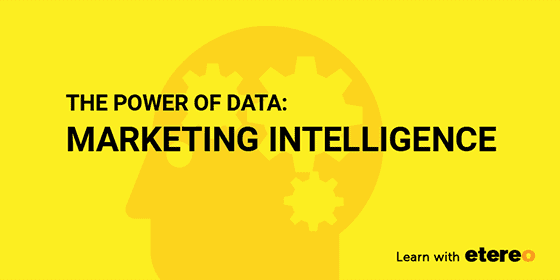The Power of Data: Marketing Intelligence

[vc_row type=”in_container” full_screen_row_position=”middle” column_margin=”default” scene_position=”center” text_color=”dark” text_align=”left” overlay_strength=”0.3″ shape_divider_position=”bottom” bg_image_animation=”none”][vc_column column_padding=”no-extra-padding” column_padding_position=”all” background_color_opacity=”1″ background_hover_color_opacity=”1″ column_link_target=”_self” column_shadow=”none” column_border_radius=”none” width=”1/1″ tablet_width_inherit=”default” tablet_text_alignment=”default” phone_text_alignment=”default” overlay_strength=”0.3″ column_border_width=”none” column_border_style=”solid” bg_image_animation=”none”][vc_column_text]
Are you spending too much time and money on advertising and marketing strategies that don’t work?
Sure, there’s no easy way to sculpt the perfect marketing strategy for any business. We spend a ton of money blindly advertising our brands, keeping our fingers crossed, and expect more customers. Marketing used to be a volume game. More people seeing your brand = more sales. Not anymore. Comparing pre and post internet burst, businesses have realised that they really didn’t know much about their customers. With the exception of our big corporate brother, small-business marketers are finding it increasingly difficult to create personalised experiences for its customers.
But what if…..
You know where your consumers are, how to capture their attention (and their hearts), read their minds and predict their behaviour?
Besides that, you could have all that information about your arch-rival (I mean your greatest competitor), discover their weaknesses and learn from them?
Now, would you have an easier time making the right marketing decisions by keeping up with what’s hot and what’s not? After all, social trends are always changing faster than expected. Likewise, brand and marketing strategies must be adapted spontaneously to keep up with those changes.
We will be looking at strategies to use that will help you make smart marketing decisions. First off, let’s learn the general discipline of which these strategies fall under, Marketing Intelligence.
Marketing Intelligence
Marketing Intelligence is the analysis of relevant and real-time data and insights from consumers, industries and trends to develop more accurate marketing strategies. These marketing strategies are what we call data-driven strategies. Marketing Intelligence when used correctly, can benefit your business in many ways; such as, building smarter campaigns, showing you current top and popular search trends, trend predictions, consumer demands and behavioural patterns, insights and infographics, adapting your product or service offerings and generating new leads and sales by targeting the right audience.
A study by Mckinsey showed that businesses that use data to support their marketing decisions enjoy productivity and profit boosts that are about 6 per cent higher than those of the competition. Another research revealed that companies measured an increase in ROI by 15 – 20 per cent.
The Importance of Data Insight
In a conversation with one of Elite Biz Hub’s brand consultants, Wendy Heng, she said Marketing Intelligence “helps business owners create ideas, insights and inspirations and align their businesses with current and upcoming trends. It is one of the best ways to find out consumer demographics and preferences. Managing these data not only improves your next action plan but also tells you things like which channel works best, how often to send messages, when to send and what kind of messages to send.”
Types of Digital Marketing Intelligence (that we use)
• Lead Generation
• Marketing Automation
• Campaign Analytics
• Website Tracking
• Consumer Demographics
• Real time Competitor Marketing Strategies
• Trends Analysis
• Behavioural Studies
• Target Audience Analysis
Vanity Metrics Trap
Vanity metrics are flashy analytics that help you keep track of your follower counts, and the types of posts that are receiving ‘Likes’ and ‘Shares’. They provide insight into how your visitors interact with your website and social media platforms. We advise you not to fall into the trap of spending too much time focusing on these kind of surface-level metrics, and focus on the ones driving revenue instead. For example, how many leads are your marketing efforts driving, how qualified are these leads and how many are turning into real customers?
Common Vanity Metrics
• Hits
• Views
• Visits
• Followers
• Unique Visitors
• Likes
• Time Spent on Site
• No. of Pages Per Visit
• Emails Collected
• No. of Downloads
Buyer Persona
Do you really understand your target audience?
What social channels are they on? What content do they read and share? What are their interests? What TV shows and celebrities do they discuss? What’s the gender skew? What about their interests, profession, and location?
As the online space becomes more crowded, it’s becoming increasingly important to have highly targeted campaigns and communications. In addition, you now can use tools to create campaigns by targeting consumers based on demographics, geographies, psychographics, and even behaviours.
Here’s an example from Facebook Audience Insights:
An estimated figure of the demographics on Facebook based on selected set of interests and age range.
Other pages liked by the same group on Facebook.
Buyer personas can be collected using analytical platforms, you will be able to split your customer base and start developing a few personas. It’s important to remember that your buyer personas will change as you discover more information about your major types of customers. Rather than assuming buyer personas based on your personal thoughts, feelings and hunches, learn more about your core customers accurately. But don’t forget to continually re-define your buyer personas to ensure you’re targeting your potential customers effectively.
Complimentary Resources
As industry trends are always changing, we offer up-to-date monthly Trends Reports in Singapore’s industry context targeting at business owners and managers, helping them to understand current trends and reach out to their target audiences.
We love to share. Sharing is Learning.
Closing Thoughts
The advantages afforded by Marketing Intelligence are manifold. In a world of fast-moving technology, the risk of not investing in such data can be huge. Marketing Intelligence helps your Brand stay one step ahead, anticipating and responding to trends in the right way and at the right time.
Marketing Intelligence should be an ongoing process, by translating these useful insights and analytics into best business decisions and marketing strategies (without overspending time and money).
To your success!
Related Posts:
Content Marketing: The New Realm of Marketing
Building a website that gets conversions
[activecampaign form=1 css=1]
[/vc_column_text][/vc_column][/vc_row]




